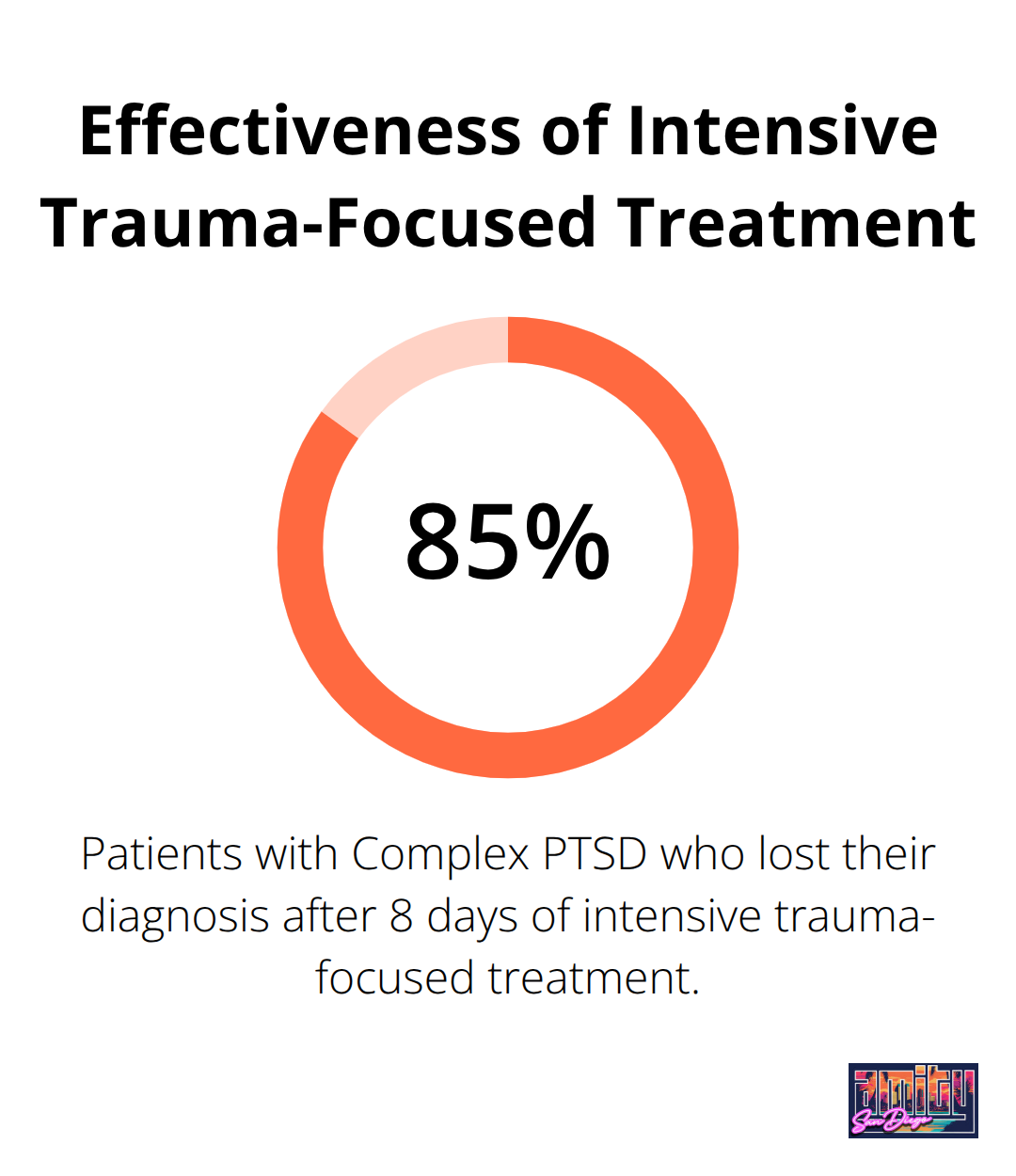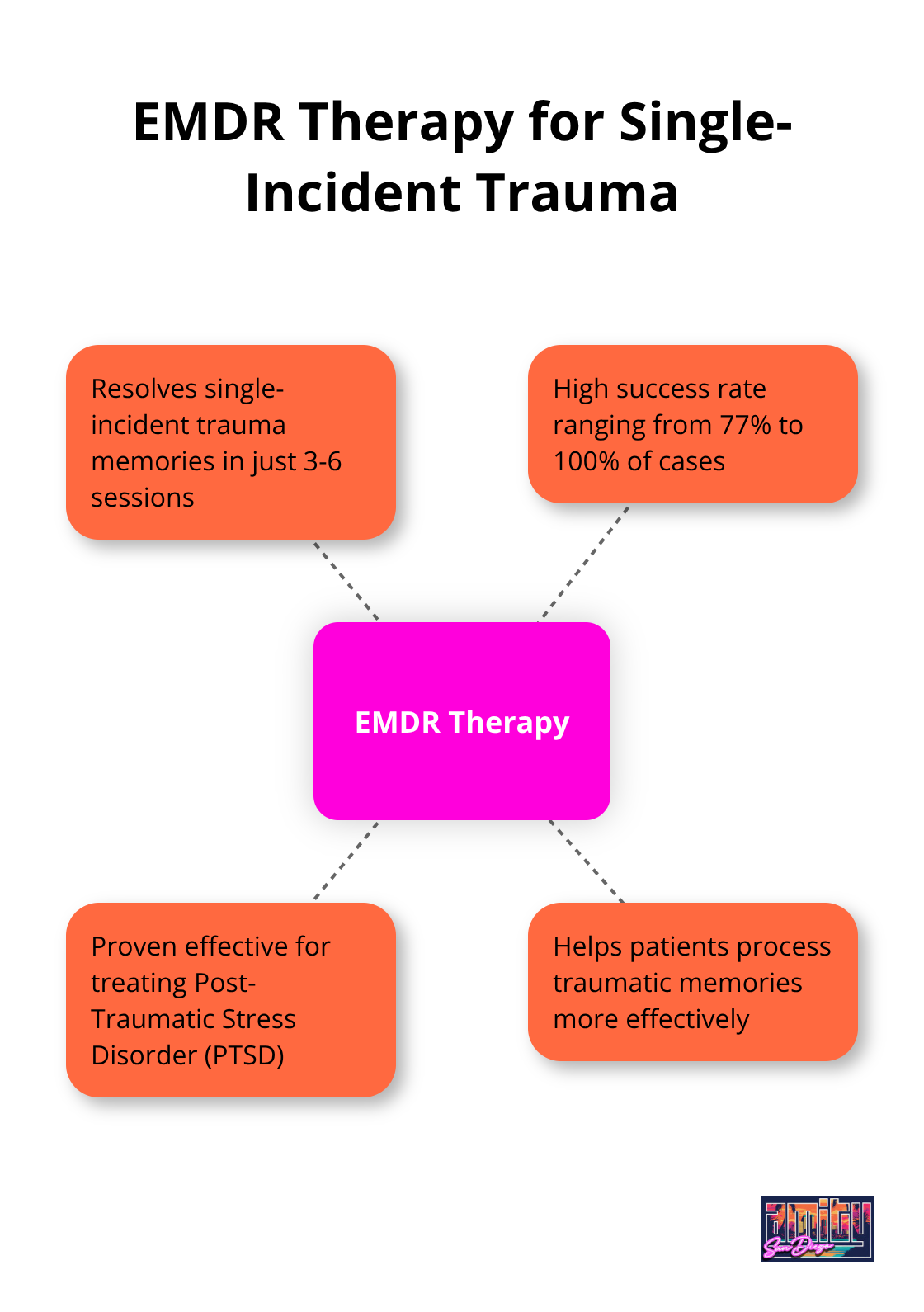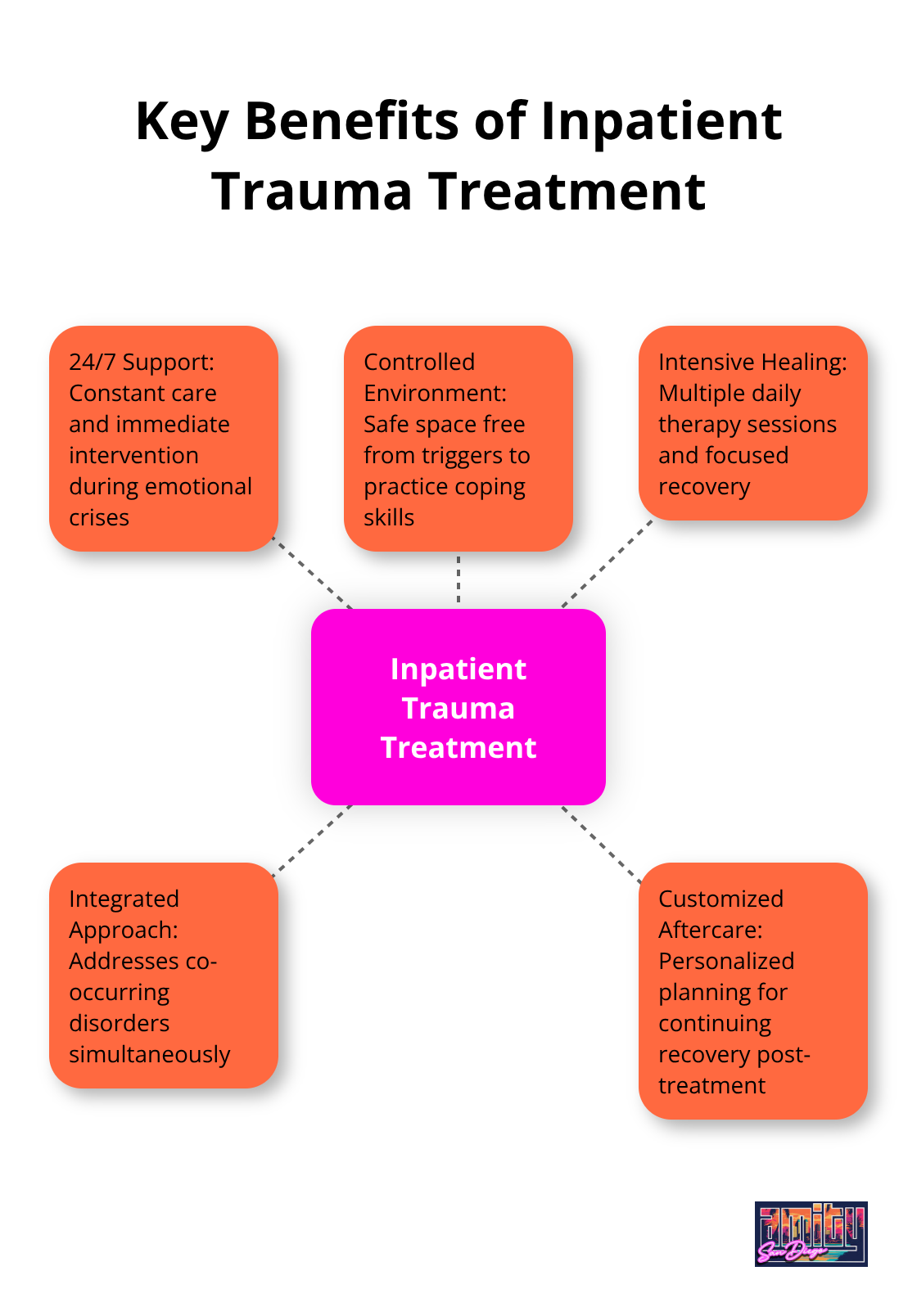Trauma can have a profound impact on a person’s life, often requiring specialized care to heal and recover. At Amity San Diego, we understand the importance of creating a safe and supportive environment for those seeking help.
Our inpatient trauma treatment programs offer a comprehensive approach to healing, combining evidence-based therapies with round-the-clock support. This blog post explores how these programs can provide the intensive care needed to overcome trauma and build a foundation for lasting recovery.
What is Inpatient Trauma Treatment?
A Safe Haven for Healing
Inpatient trauma treatment offers an intensive, residential approach to healing deep-seated emotional wounds. This immersive care model transforms lives by providing a controlled environment where individuals focus entirely on recovery. The setting removes external stressors and triggers, allowing patients to concentrate on their healing journey. A study revealed that over 85% of patients diagnosed with Complex PTSD lost their diagnosis after 8 days of intensive trauma-focused treatment.
Addressing Complex Trauma
Inpatient care proves particularly effective for those dealing with severe or complex trauma. This includes survivors of childhood abuse, combat veterans, and victims of domestic violence. The 24/7 support allows for immediate intervention during emotional crises, which is essential for those with PTSD or dissociative disorders.

Intensive vs. Outpatient Care
While outpatient therapy has its place, inpatient treatment offers distinct advantages. Research suggests that symptoms of depression, anxiety, and PTSD were reduced in more patients in the long-term group starting one year after trauma compared to the short-term group.
Inpatient care provides:
- Structured daily routines
- Continuous monitoring and support
- Immersive therapy sessions
- Peer support from fellow survivors
Outpatient care, while more flexible, may not offer the intensity needed for severe trauma cases. However, it serves as an excellent step-down option after inpatient treatment.
Personalized Treatment Paths
Each individual’s needs require careful assessment to determine the most effective treatment path. The goal is to provide a safe, supportive environment where true healing can begin. This might involve intensive outpatient programs or guidance towards appropriate inpatient care when necessary.
The Role of Specialized Therapies
Inpatient trauma treatment often incorporates specialized therapies tailored to address trauma-related issues. These may include:
- Eye Movement Desensitization and Reprocessing (EMDR)
- Cognitive Behavioral Therapy (CBT)
- Dialectical Behavior Therapy (DBT)
- Somatic Experiencing
These evidence-based approaches (when combined with the structured environment of inpatient care) can lead to significant breakthroughs in trauma recovery.
As we explore the key components of effective inpatient trauma programs, we’ll uncover how these specialized therapies work in tandem with other crucial elements to create a comprehensive healing experience.
What Makes Inpatient Trauma Programs Effective?
At Amity San Diego, we’ve witnessed how specific components create successful inpatient trauma programs. Our approach combines evidence-based therapies with a trauma-informed care model, delivered by a multidisciplinary team in a structured environment.
Evidence-Based Therapies: The Foundation of Healing
We utilize various proven therapies to address trauma. Eye Movement Desensitization and Reprocessing (EMDR) shows remarkable results in treating PTSD. Previous published research indicates that EMDR therapy can resolve a single-incident trauma memory in three to-six sessions 77–100% of the time.
Cognitive Behavioral Therapy (CBT) and Dialectical Behavior Therapy (DBT) form cornerstones of our program. CBT helps patients reframe negative thought patterns, while DBT teaches skills for emotional regulation.

Trauma-Informed Care: A Compassionate Approach
Our trauma-informed approach recognizes the widespread impact of trauma and understands potential recovery paths. This method creates a physically and emotionally safe environment, fosters trust, and empowers patients to make choices in their treatment.
A recent study aimed to understand the mechanisms and outcomes effective in implementing trauma-informed care across health systems using a systematic review of reviews and realist synthesis.
Multidisciplinary Team: Comprehensive Expertise
Our treatment team includes psychiatrists, psychologists, nurses, and holistic practitioners. This diverse expertise allows us to address trauma from multiple angles. For example, our psychiatrists manage medication while our yoga instructors teach grounding techniques for managing anxiety.
Structured Environment: The Backbone of Recovery
A typical day in our program includes:
6:30 AM: Wake-up and morning meditation7:30 AM: Breakfast9:00 AM: Group therapy session11:00 AM: Individual therapy12:30 PM: Lunch2:00 PM: Skill-building workshop (e.g., DBT skills)4:00 PM: Exercise or art therapy6:00 PM: Dinner7:30 PM: Support group meeting9:30 PM: Evening reflection and journaling
This structure provides a sense of safety and predictability (crucial for trauma survivors). It also ensures that patients receive a comprehensive mix of therapies and activities each day.
Group and Individual Therapy: A Balanced Approach
We balance group and individual therapy sessions. Group therapy offers peer support and the opportunity to practice interpersonal skills. Individual therapy allows for deeper exploration of personal traumas and tailored interventions.
A recent study aimed to test whether combining a novel group intervention to individual treatment is superior to conventional individual out-patient treatment.
These key components create a healing environment where true recovery begins. In the next section, we’ll explore the specific benefits of inpatient trauma treatment at Amity San Diego, including our 24/7 support system and holistic treatment approaches.
Why Choose Inpatient Trauma Treatment?
At Amity San Diego, we’ve witnessed how inpatient trauma treatment transforms lives. Our approach offers unique benefits that outpatient care can’t match.
24/7 Support: A Safety Net for Recovery
Inpatient treatment provides constant care, which is essential for those dealing with severe trauma. The 24/7 support also provides peace of mind for family members who may be concerned about their loved one’s well-being.
Our staff remains available at all times. Whether you struggle with nightmares at 2 AM or need support during a panic attack, we’re there. This level of care creates a safety net that allows patients to focus fully on their recovery.

A Controlled Environment: Free from Triggers
Removing patients from their everyday environment is another key benefit. At home, trauma survivors often face constant reminders of their experiences. These triggers can hinder recovery and make it difficult to implement new coping strategies.
In our inpatient setting, we create a controlled environment free from these triggers. This allows patients to build resilience and practice coping skills in a safe space before returning to their daily lives.
Intensive Healing Experience: Accelerated Recovery
Inpatient treatment offers an intensive, focused healing environment. Patients engage in multiple therapy sessions daily, participate in group activities, and have time for self-reflection. This immersive experience can speed up the healing process.
We offer a combination of traditional therapies (like CBT and EMDR) alongside holistic approaches (such as yoga and art therapy). This comprehensive treatment addresses trauma from multiple angles, promoting faster and more complete healing.
Integrated Approach: Addressing Co-occurring Disorders
Our integrated approach allows us to treat co-occurring disorders effectively. Many trauma survivors struggle with substance abuse or other mental health issues. In our inpatient setting, we address all these concerns simultaneously, leading to better overall outcomes.
Customized Aftercare: Continuing the Recovery Journey
We place a strong emphasis on aftercare planning. We work closely with each patient to develop a customized plan for continuing their recovery after leaving our facility. This might include outpatient therapy, support groups, or ongoing medication management.
Addiction aftercare provides the support and structure needed for lasting recovery. It’s vital after treatment to prevent relapse.
Inpatient trauma treatment offers a unique opportunity for intensive, focused healing in a safe and supportive environment. While it requires a significant time commitment, the benefits can be life-changing for those struggling with severe trauma.
Final Thoughts
Inpatient trauma treatment programs provide a powerful path to healing for individuals with deep emotional wounds. At Amity San Diego, we offer round-the-clock support, a trigger-free environment, and a comprehensive treatment model. Our immersive experience accelerates recovery and builds a solid foundation for long-term wellness.
Professional help for trauma is essential to reclaim your life. Trauma requires dedicated care and expert guidance to process and heal. Our team at Amity San Diego commits to provide support through evidence-based therapies and personalized treatment plans.
Recovery extends beyond our facility, so we emphasize aftercare planning. We ensure each client has the tools and support to maintain progress. If you or a loved one struggles with trauma, help is available. Contact Amity San Diego today to start your journey towards healing and reclaim your future.



